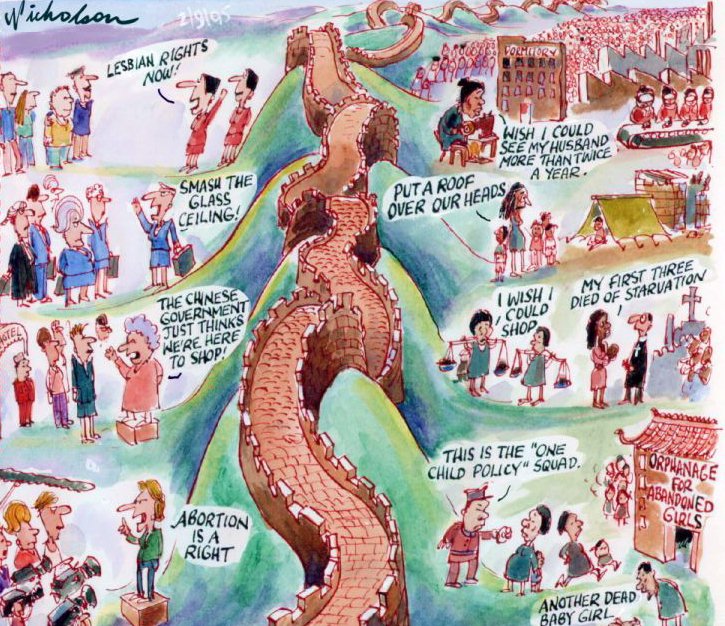 |
||||
|
International FeminismUnited Across Borders: The History of International Feminism International feminism represents a powerful and interconnected movement that transcends national boundaries, uniting women across the globe in the fight for gender equality and women's rights. This article explores the rich history of international feminism, tracing its origins, key milestones, and influential figures who have contributed to the global struggle for gender justice and social change. Early Roots and Activism: The roots of international feminism can be traced back to the late 19th century when women's suffrage movements emerged in different parts of the world. Organizations like the International Council of Women, founded in 1888, laid the foundation for transnational collaboration and solidarity among feminist activists. The First Wave of International Feminism: The first wave of international feminism coincided with the suffrage movement, focusing on securing women's right to vote. Notable events include the formation of the International Women's Suffrage Alliance in 1904, which brought together suffragists from various countries to advocate for political rights and challenge discriminatory laws. Intersectionality and Global Activism: As feminism evolved, the concept of intersectionality gained prominence within the international feminist movement. Activists recognized that gender inequality intersects with other forms of discrimination, such as race, class, and sexuality. Women like Sojourner Truth, Rosa Luxemburg, and Audre Lorde highlighted the importance of addressing these intersecting oppressions. Decolonization and Feminist Movements: The mid-20th century saw the rise of feminist movements in post-colonial countries. Women activists in Africa, Asia, and Latin America fought for both national liberation and gender justice. Prominent figures like Funmilayo Ransome-Kuti, Nawal El Saadawi, and Rigoberta Menchú challenged colonial legacies and patriarchal norms, advocating for women's rights within their respective societies. United Nations and Global Feminist Advocacy: The establishment of the United Nations (UN) in 1945 provided a platform for international feminist advocacy. The UN Women's Conferences in Mexico City (1975) and Nairobi (1985) brought together activists from around the world to address gender equality, reproductive rights, violence against women, and other pressing issues. Second Wave and Third Wave Feminism: The second wave of international feminism emerged in the 1960s, focusing on issues beyond suffrage, such as reproductive rights, workplace equality, and sexuality. Prominent organizations like the Women's International League for Peace and Freedom and the Global Fund for Women played crucial roles in advancing women's rights on a global scale. The third wave, starting in the 1990s, emphasized diversity, inclusivity, and intersectionality, amplifying the voices of marginalized women and promoting a more expansive feminist agenda. Transnational Solidarity and Grassroots Activism: International feminism is characterized by transnational solidarity and grassroots activism. Women's rights organizations, networks, and campaigns like the Global Women's Strike, #MeToo, and the One Billion Rising movement have gained momentum, addressing gender-based violence, economic inequality, and systemic oppression. Global Feminist Movements Today: In the present day, international feminism continues to thrive and adapt to new challenges. Online activism, social media campaigns, and women-led movements like Ni Una Menos in Latin America and the Women's Marches across continents demonstrate the power of collective action and global solidarity. Conclusion: The history of international feminism reflects the shared struggles, triumphs, and ongoing efforts to achieve gender equality on a global scale. From early suffrage movements to contemporary intersectional activism, feminists worldwide have united to challenge patriarchal systems, advocate for women's rights, and strive for a more inclusive and just world. International feminism reminds us that our struggles are interconnected, and by standing together across borders, we can create lasting change for generations to come.
International Feminism BooksBelow is a list of books that delve into the topic of international feminism, exploring the global struggles, achievements, and complexities of the movement:
|
|
|||
|
|
||||
|
Freedom and Feminism for AllFeminism isn't limited to Europe and the Americas. It is a global movement towards equality for all women.
International to Transnational Feminism
|
||||
 |
Health Matters - Historical Feminism - International Feminism - Lesbian Feminism - Male Feminism - Modern Feminism - Musical Feminism Philosophy of Feminism - Postfeminism - Pro-Choice Feminism - Quotes by Feminists - Religion and Feminism - Sports and Feminism |
 |
||
